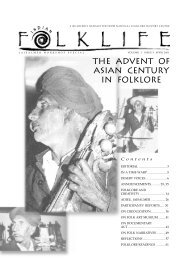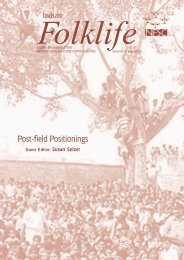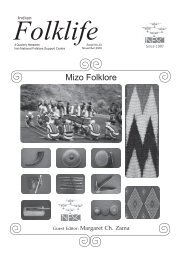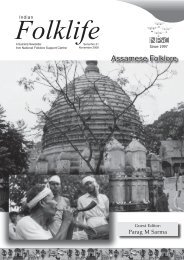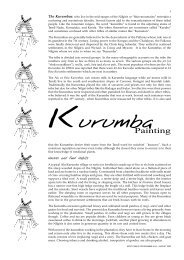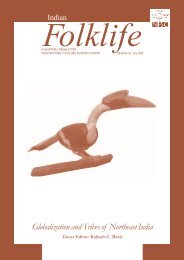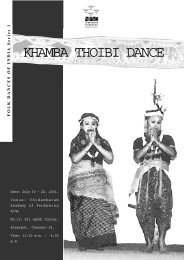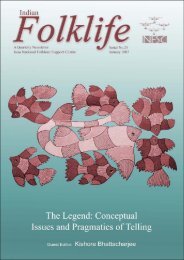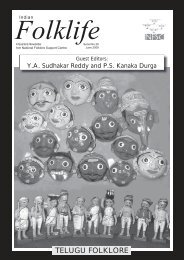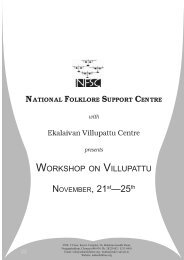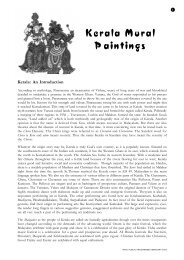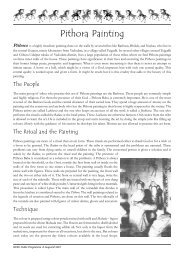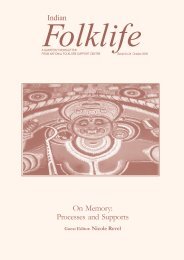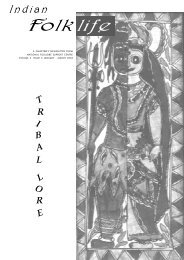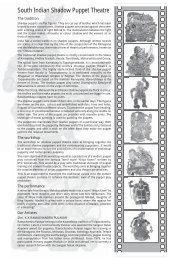Tripura Folklore - Wiki - National Folklore Support Centre
Tripura Folklore - Wiki - National Folklore Support Centre
Tripura Folklore - Wiki - National Folklore Support Centre
You also want an ePaper? Increase the reach of your titles
YUMPU automatically turns print PDFs into web optimized ePapers that Google loves.
17<br />
scholars, a very important material<br />
for historical reconstruction. The<br />
social and economic structure of a<br />
particular society, in those distant<br />
days, are reflected in the oral<br />
literature of a community.<br />
That the folk-tales contain<br />
materials more than meet the eye<br />
was realised as early as in the seventeenth<br />
century, when the genre appeared in printed<br />
form in France. However, it took nearly a<br />
couple of centuries to formulate scientific<br />
approaches to its study. At first folk-tales<br />
were equated with fairy tales. Only later, the<br />
anthropologists and folklore scholars identified<br />
its inherent property of belonging to oral<br />
tradition. Like the ‘natural epics’, folklores also<br />
grow in the society without specific authorship.<br />
Unlike those epics, they are seldom attributed<br />
to any illustrious individual in later periods.<br />
<strong>Folklore</strong>s are ‘texts’ in the true sense, and<br />
not ‘works’.<br />
We may locate the beginning of systematic<br />
study of folk-lores as a subject in early<br />
nineteenth century. The early studies were<br />
comparative in nature; trying to locate the<br />
origins and meanings, and also attempting<br />
to compare the variations. In the process,<br />
different assumptions were forwarded like<br />
the theory of inheritance of common Indo-<br />
European past. Most of these hypotheses have<br />
lost importance in more modern approaches;<br />
but some of these older assumptions appear<br />
worth reconsideration, like the Comparative<br />
Mythological theory, when we come across<br />
Indian folklores bearing similarities, even if<br />
distant, with ancient epics, religious texts<br />
or myths.<br />
In modern studies of folklores the Historical/<br />
Geographic approach receives importance. The<br />
Structural Study Approach has also helped<br />
scientific classification. The materials are now<br />
classified into ‘tale types’ backed by an almost<br />
exhaustive ‘type index’. Each traditional tale<br />
having an independent existence constitutes a<br />
type. There are variables in folk-tales; through<br />
these variables, the relationship of the constant<br />
element can be discovered among folklores<br />
through the categorisation of motifs. Motifindex<br />
is thus another very useful means in the<br />
hands of folklorists. <strong>Folklore</strong>, folk-tales or oral<br />
literature as such, are a subject of methodical<br />
scientific study today. The processes are rather<br />
elaborate and complex, but the labour is always<br />
well rewarded.<br />
In present-day study of oral literature, a<br />
relevant question has raised its head: Whether<br />
oral literature should be subjected to the tenets<br />
of literary criticism used for written literature,<br />
or should it have its own aesthetics Opinions<br />
differ widely. One school holds the thought<br />
that oral literature is also basically literature.<br />
In modern schools of criticism we have learnt<br />
to judge a creation as a ‘text’, by its own merit<br />
and by its own standards. Such approaches<br />
can well accommodate oral literature into its<br />
compass. Yet, it does not appear to be the only<br />
way; for oral literature has in it some elements<br />
of performing arts. Renderings by different<br />
individuals may affect the meaning without<br />
any change in the content. Conventional<br />
critical principles are more or less rules to<br />
judge the perfection in the application of skill<br />
in conscious artistic creations, which oral<br />
literature is not.<br />
Dr Mrs Arundhati Ray<br />
The contributor: A social worker and activist,<br />
Dr Mrs Ray is a familiar name in literary circles.<br />
A performing artist of merit, Dr Ray is a freelance<br />
writer. For her Doctoral work, she had<br />
undertaken extensive research work on oral<br />
literature, particularly folk-tales of the locality.<br />
Sometimes she accepts assignments as visiting<br />
faculty to University departments. ❆<br />
INDIAN FOLKLIFE SERIAL NO.35 JANUARY 2010



